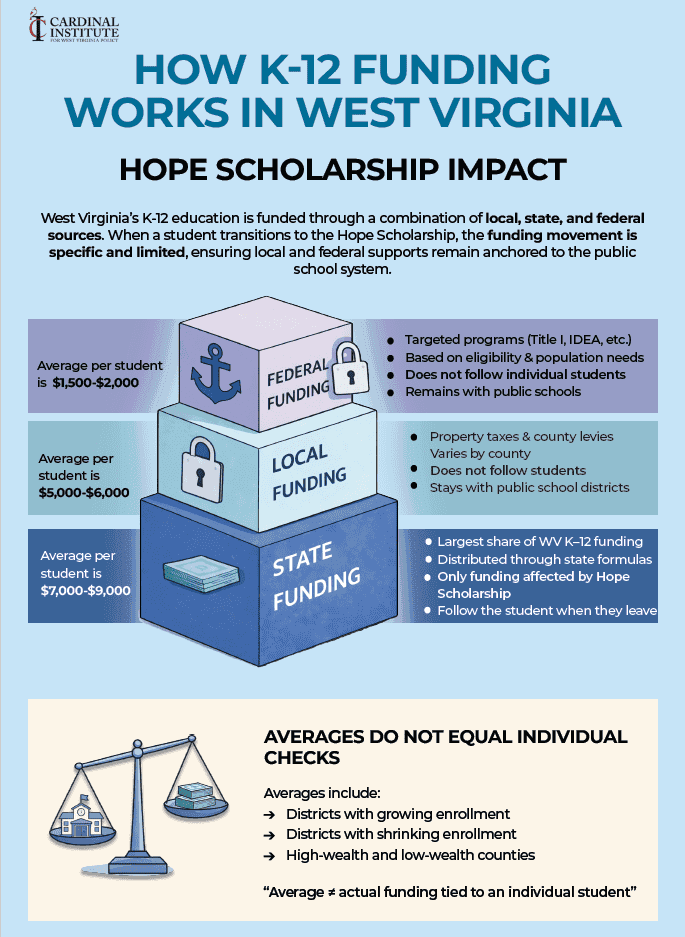
Hope Scholarship Lawsuit: What’s Happened So Far
Cardinal Team
The Hope Scholarship Lawsuit So Far
As families try to navigate their options, it is important that they understand the legal proceedings surrounding the Hope Scholarship. This post won’t go into great detail about the parties who brought the lawsuit. You can read more about them in my article “Who Is Really Behind the Hope Scholarship Lawsuit?”
Intent to Sue
In September of 2021 an initial intent to sue was filed by Mountain State Justice. However, since September, they have taken no action. As far as we know, Mountain State Justice is not involved in the current Hope Scholarship lawsuit.
In January of 2022, Public Funds Public Schools – a campaign comprising the Education Law Center, the Southern Poverty Law Center, and SPLC Action and attorney Tamerlin Godley, Esq. – announced their intent to sue. Their claims against the program are largely the same as those argued by Mountain State Justice.
Filing the Hope Scholarship Lawsuit
The lawsuit was formally filed on January 19, 2022. Initially, the hearing was scheduled for April 19th with Judge Bloom presiding. However, Judge Bloom recused himself because he has a relative who works for the WV Department of Education. Subsequently, Judge Jennifer Bailey recused herself. She recused herself because she was related to an attorney at the plaintiff’s law firm. Judge MaryClare Akers who was newly appointed also recused herself. Judge Joanna Tabit was finally assigned to the case. On April 12, 2022 as part of the ongoing lawsuit, the plaintiffs requested a preliminary injunction to halt the implementation of the program.
The Hearing & Ruling
On July 6th, 2022, Judge Tabit of the Kanawha County Circuit Court granted a preliminary and permanent injunction against the Hope Scholarship. The injunction, which immediately went into effect, halts the program’s operations pending the outcome of the appeals process.
The plaintiffs assert the program is unconstitutional for a variety of reasons. The primary reason is their belief that the state legislature can only fund public schools. Their specific claim is rooted in Article XII, Sections I, 4 and 5. These sections of the West Virginia Constitution deal with public education in the state. Section I requires that “The Legislature. . .provide, by general law, for a thorough and efficient system of free schools.” Sections 4 and 5 deal with funding for public schools. You can read further analysis of the plaintiffs’ arguments from our friends at EdChoice.
During the courtroom proceedings, the plaintiffs focused on the funding model in the state constitution. During the proceedings the plaintiff’s argued that the scholarship provides, “a monetary incentive for students to leave the public school system, depleting public school budgets that are significantly based on enrollment.” The defendants responded by arguing that the funds are drawn from the general fund similar to roads or public libraries.
Following the hour-long hearing, Judge Tabit ruled from the bench, granting a preliminary and permanent injunction.
The Injunction
A preliminary injunction is different from a permanent one. A preliminary injunction is used to maintain the status quo until the court settles the main appeals process. A permanent injunction is issued at the final judgment of the case. The preliminary injunction is not a statement of final judgment on a matter. By issuing the preliminary AND permanent injunction, Judge Tabit rendered this her final judgment. Only a superior court can change this.
When issuing her ruling, Judge Tabit said, “In my view, the plaintiffs and the public school system will suffer irreparable harm if the scholarship program and the legislation establishing it are not enjoined from being implemented.”
Since the injunction is in place, all operations of the program have ceased. This means parents will not receive funds. Providers cannot sign up to participate. No one can apply for the program. Nothing can happen until a court either stays the injunction or concludes the appeals process.
An Appeal & a Stay
After the ruling, the defendants announced their intention to appeal the ruling. On July 25th, and without a written order from Judge Tabit, the Attorney General’s office and the Institute for Justice each filed a request for a stay of the injunction with the Intermediate Court of Appeals (ICA). Three judges sit on the newly created ICA:
- Chief Judge Daniel W. Greear
- Judge Thomas E. Scarr
- Judge Charles Lorensen
Before the court issued their ruling on August 2, 2022, Chief Judge of the Intermediate Court Dan Greer recused himself. This was done because of his work as the Legal Counsel to the Speaker of the House when the Hope Scholarship bill, HB 2013, was written. In his place, Greenbrier County Judge Jennifer Dent was selected to join the court and rule on the injunction.
On August 2, 2022, the ICA rejected the request for a stay of the injunction. The stay, as requested, would have allowed the program to resume its operations. Because it was denied, the program remains halted. This is pending the conclusion of the appeals process or another court acting on the injunction.
It is important to note that the request for a stay on the injunction is separate from the appeals process handling the constitutional question. The Supreme Court of Appeals of West Virginia will settle the overarching constitutional questions, most likely at a later date. Five justices make up the Court:
- Chief Justice John A. Hutchison
- Justice Elizabeth D. Walker
- Justice Tim Armstead
- Justice William R. Wooton
- Justice C. Haley Bunn
The Supreme Court reconvenes on September 7th, 2022.
Andrew Bambrick is the Education Outreach Coordinator for the Cardinal Institute for WV Policy.







